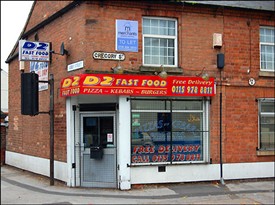Nottingham's first Co-operative Society

The site of Nottingham's first Co-op. Due to be pulled down any time soon for Net Phase Two.
The Lenton & Nottingham Co-Operative Society
By Joseph Earp
Emperor Napoleon Bonaparte declared England to be 'a nation of shopkeepers'.
Napoleon was actually referring to the country's love of trade and
commerce rather than actual shops and their proprietors.
With the rise of the modern out-of-town shopping centres and supermarkets, 24 hour, 7 days a week, shopping today Monsieur Bonaparte might have said: 'England is a nation of shops and the English a nation of shoppers.'
In nearly 300 years, shops and shopping habits may have changed but there is one thing that began around the Emperor's time which grew to a national institution and is still around today — the 'Cooperative movement’.
The idea of 'Friendly' and 'Mutual' societies for the purpose of insurance and banking has been around since 1498. However, based on the same principle (shared ownership), the co-operative relating to the consumer trade began in 19th Century Europe, primarily in England.
The Industrial Revolution saw the population of towns and cities rise dramatically with an influx of rural poor, working or seeking work in the new factories and mills. The few shops and markets of the time could not cope with the rising demand for food and other necessities. Workers found themselves faced with higher prices and in many cases, a retail supply that was controlled by the factory and mill owners.
In Fenwick, Scotland in 1769, a group of weavers jointly purchased from a farmer a sack of oatmeal and sold it at discount prices to fellow workers. The consumer cooperative had been born and over the following century the idea spread.
In the 1800s Co-operative Society shops — where food and goods purchased directly from the grower or maker were retailed at discount prices to members — sprang up all over the country.
It was events in Lancashire, the Lancashire Cotton Famine, which prompted the founding of the Nottingham Co-op. In the mid 1860s,the cotton mills of Lancashire were at the height of production, with cheap and plentiful cotton coming from the Southern States of America. With the outbreak of the American Civil War this supply of cotton was cut off and the mill workers went from being amongst the highest paid to unemployed.
In 1863, Messrs Thomas Bayley and Benjamin Walker, from the Tanning Works at Lenton, visited Lancashire to see the effect of the famine.
On returning home, convinced by the benefit of Co-operative and Mutual Societies' effect on alleviating the worst of the problems, they founded 'The Lenton Industrial and Provident Society'.
When the first retail shop was opened, on the corner of Gregory and Abbey streets, Lenton, the rather formal name had changed to The Lenton and Nottingham Co operative Society and, later, simply the Nottingham Co-operative Society. By 1914, the Society had over 50 shops and 13,000 members with an annual turnover of £250,000.
In 1873, Lenton and Nottingham Society opened a branch at Meadow End in Gotham. By 1898 this shop had been joined by No. 9 Branch ofthe Long Eaton Co-operative Society, which opened in Wallace St, moving in 1904 to larger premises across the road. The first week's takings were £34, which by 1928 had
risen to £311.
Both shops continued trading as branches of the Greater Nottingham Co-operative Society until the 1980s. The Lenton shop, after passing through various incarnations, the last as a take-away, now stands empty and awaits demolition to make way for the Nottingham Tram extension.
Article by the Nottingham Hidden History Team.